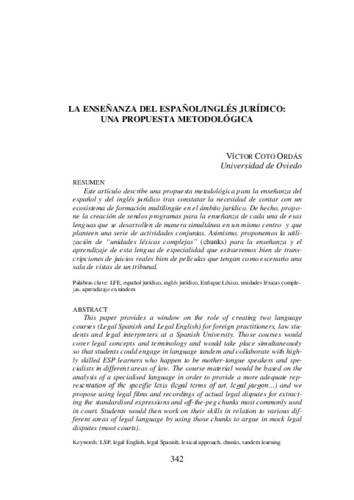La enseñanza del español/inglés jurídico: una propuesta metodológica
Author:
Subject:
Enfoque léxico
Lenguaje jurídico
Inglés jurídico
Español con Fines Específicos
Aprendizaje en tándem
Publication date:
Editorial:
Asociación Española de Lingüística Aplicada
Descripción física:
Abstract:
Este artículo describe una propuesta metodológica para la enseñanza del español y del inglés jurídico tras constatar la necesidad de contar con un eco-sistema de formación multilingüe en el ámbito jurídico. De hecho, propone la creación de sendos programas para la enseñanza de cada una de esas lenguas que se desarrollen de manera simultánea en un mismo centro y que planteen una serie de actividades conjuntas. Asimismo, proponemos la utilización de “unidades léxicas complejas” (chunks) para la enseñanza y el aprendizaje de esta lengua de especialidad que extraeremos bien de transcripciones de juicios reales bien de películas que tengan como escenario una sala de vistas de un tribunal. This paper provides a window on the role of creating two language courses (Legal Spanish and Legal English) for foreign practitioners, law students and legal interpreters at a Spanish University. Those courses would cover legal concepts and terminology and would take place simultaneously so that stu-dents could engage in language tandem and collaborate with highly skilled ESP learners who happen to be mother-tongue speakers and specialists in dif-ferent areas of law. The course material would be based on the analysis of a specialised language in order to provide a more adequate representation of the specific lexis (legal terms of art, legal jargon…) and we propose using legal films and recordings of actual legal disputes for extracting the standard-ised expressions and off-the-peg chunks most commonly used in court. Students would then work on their skills in relation to various different areas of legal language by using those chunks to argue in mock legal disputes (moot courts).
Este artículo describe una propuesta metodológica para la enseñanza del español y del inglés jurídico tras constatar la necesidad de contar con un eco-sistema de formación multilingüe en el ámbito jurídico. De hecho, propone la creación de sendos programas para la enseñanza de cada una de esas lenguas que se desarrollen de manera simultánea en un mismo centro y que planteen una serie de actividades conjuntas. Asimismo, proponemos la utilización de “unidades léxicas complejas” (chunks) para la enseñanza y el aprendizaje de esta lengua de especialidad que extraeremos bien de transcripciones de juicios reales bien de películas que tengan como escenario una sala de vistas de un tribunal. This paper provides a window on the role of creating two language courses (Legal Spanish and Legal English) for foreign practitioners, law students and legal interpreters at a Spanish University. Those courses would cover legal concepts and terminology and would take place simultaneously so that stu-dents could engage in language tandem and collaborate with highly skilled ESP learners who happen to be mother-tongue speakers and specialists in dif-ferent areas of law. The course material would be based on the analysis of a specialised language in order to provide a more adequate representation of the specific lexis (legal terms of art, legal jargon…) and we propose using legal films and recordings of actual legal disputes for extracting the standard-ised expressions and off-the-peg chunks most commonly used in court. Students would then work on their skills in relation to various different areas of legal language by using those chunks to argue in mock legal disputes (moot courts).
Description:
Congreso Internacional de la Asociación Española de Lingüística Aplicada (AESLA 2016) (34º. 2016. Alicante)
ISSN:
Patrocinado por:
Este trabajo se ha realizado con la ayuda obtenida para apoyar actividades de grupos de investigación de Arte, Humanidades y de Ciencias Sociales y Jurídicas de la Universidad de Oviedo, financiada por la Consejería de Educación, Cultura y Deporte del Principado de Asturias [Cód. 2015-10863]
Collections
Files in this item




